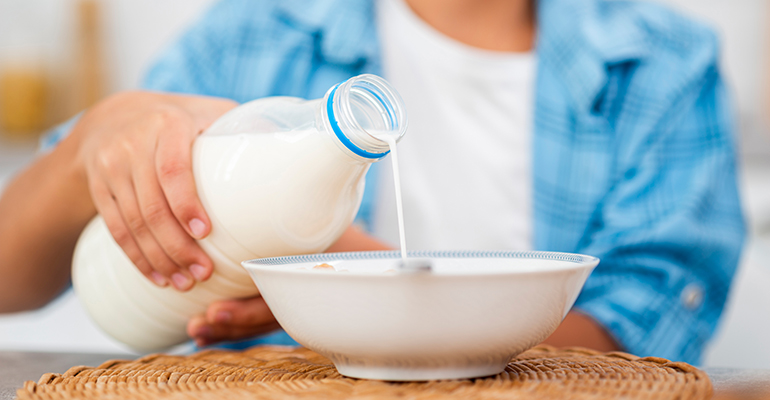Covid-19: International dairy sector under pressure
25 Apr 2020The novel coronavirus crisis has shaken the entire food and beverage industry, but the dairy sector has been particularly hard hit as demand for many dairy products has evaporated. What happens next for the dairy industry?
Closure of the foodservice sector has had an especially significant impact on global dairy demand, although in many countries, increased at-home purchases of dairy products are helping to ease the overall pressure on supply chains.

In China, most butter and cream is imported, often for use in western-style products available in restaurants and foodservice, so the impact on first quarter sales has been felt strongly by suppliers in Europe, Australia and New Zealand. On a domestic level, too, UK dairy farmers have warned that the lack of dairy demand from foodservice could force them to cull cattle, while US dairy trade groups have estimated that supply exceeds demand by at least 10%.
European dairy farmers have called on the European Commission to activate voluntary production cuts across the region to safeguard prices, and to prevent producers from pouring away millions of litres of milk, while US dairy groups have called for government assistance.
Individual companies and farmer cooperatives already have taken their own measures to prevent long-term damage to the sector. Danish dairy group Arla Foods, for instance, has said it will prioritise products for everyday life at home, such as fresh dairy products, infant nutrition, cooking products, long-life milk, nutritional products for the medical sector, and milk powder for countries outside Europe. Meanwhile, Irish nutrition group Glanbia has said it has traded reasonably well because its main focus is on retail markets, and although getting products to many international markets has been difficult, this has been offset by higher demand in North America in particular.
Rabobank’s latest research note on the sector suggests that it will go through three distinct phases of market movement over the next year, from panic-buying, to lower retail demand and greater logistical challenges, to longer-term loss of consumer purchasing power. In the EU, some countries and products – like processed cheeses and mozzarella – are especially exposed to the closure of foodservice channels.
However, it added that there were reasons for the global dairy sector to be optimistic about a return to normal. China’s consumer buying patterns are likely to normalise by the second half of 2020, it said, and there are signs that this is already happening in some supply chains. The faster each country gains control of the pandemic within its own borders, the faster dairy demand will return across the board.
In the meantime, many larger dairy companies may be able to redistribute milk to long-life and retail products, but smaller companies with more limited product portfolios are likely to face greater pressure.
Related news

Plastic packaging reduction requires industry rethink
6 Jan 2023
The food and beverage sector is calling for industry-wide collaboration and business model updates to reduce the environmental impact of plastic packaging.
Read more
Misleading nutrition claims mask true sugar levels in baby food
5 Jan 2023
Some baby and toddler food and drink products, sweetened with fruit concentrate, contain up to four teaspoons of sugar per serving yet are marketed as having ‘no added sugar’, according to a survey by Action on Sugar.
Read more
Asian beverage brands deal with rising costs
4 Jan 2023
Decreasing bottle sizes or increasing prices? Asian beverage brands are finding “creative approaches” to manage rising costs, according to industry analysts.
Read more
Preserving the freshness of food to fight waste
3 Jan 2023
Several companies are producing products that absorb ethylene, the hormone that causes food to ripen, in attempt to reduce food waste.
Read more
Value-seeking US consumers cut back on food spending
2 Jan 2023
Cheaper items, smaller sizes, and shorter grocery lists: inflationary effects coupled with a global long-term recession are set to continue shaping food spending habits, according to a recent Rabobank report.
Read more
Opportunities grow for lower-caffeine coffee
23 Dec 2022
Many consumers want the mental focus of caffeine without the jitters, prompting a wave of product development such as “half caffeine” ground coffee or ready-to-drink (RTD) cold brew blended with relaxing botanicals.
Read more
Superfrau upcycles liquid whey for energy drinks
22 Dec 2022
US company Superfrau turns surplus whey into sustainable, upcycled-certified dairy products for the recovery drinks market.
Read more
Malaysian brand Nanka brings jackfruit range to Europe
21 Dec 2022
Malaysian brand Nanka is expanding to new Asian and European markets with its fast and ready-to-eat plant-based products based on jackfruit.
Read more
Is the UK on target to meet its 2025 Plastics Pact?
20 Dec 2022
Major food industry players, including Arla, Kerry, PepsiCo and TerraCycle, have signed the UK’s voluntary Plastic Pact to reduce plastic from the supply chain – but are they on track to meet their targets?
Read more
Chinese food brand wants to give customers ‘the full experience’
16 Dec 2022
Food brand Xiao Chi Jie is revamping Chinese cuisine for the modern American consumer. The Washington-based company sells regional Chinese specialties like soup dumplings, noodle kits, and barbeque skewers direct-to-consumer in the US.
Read more
